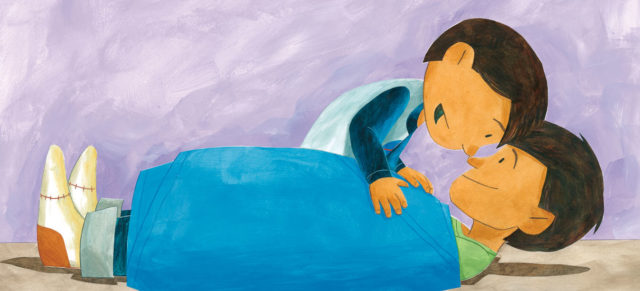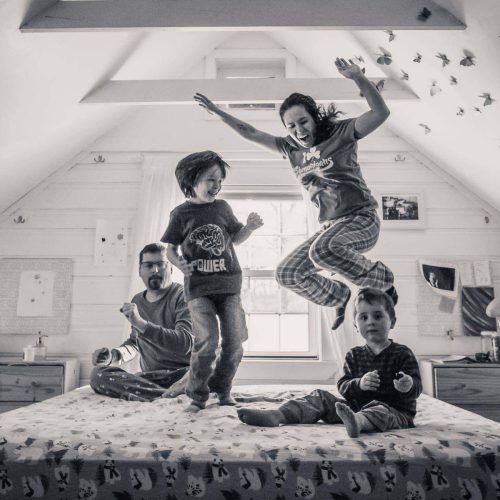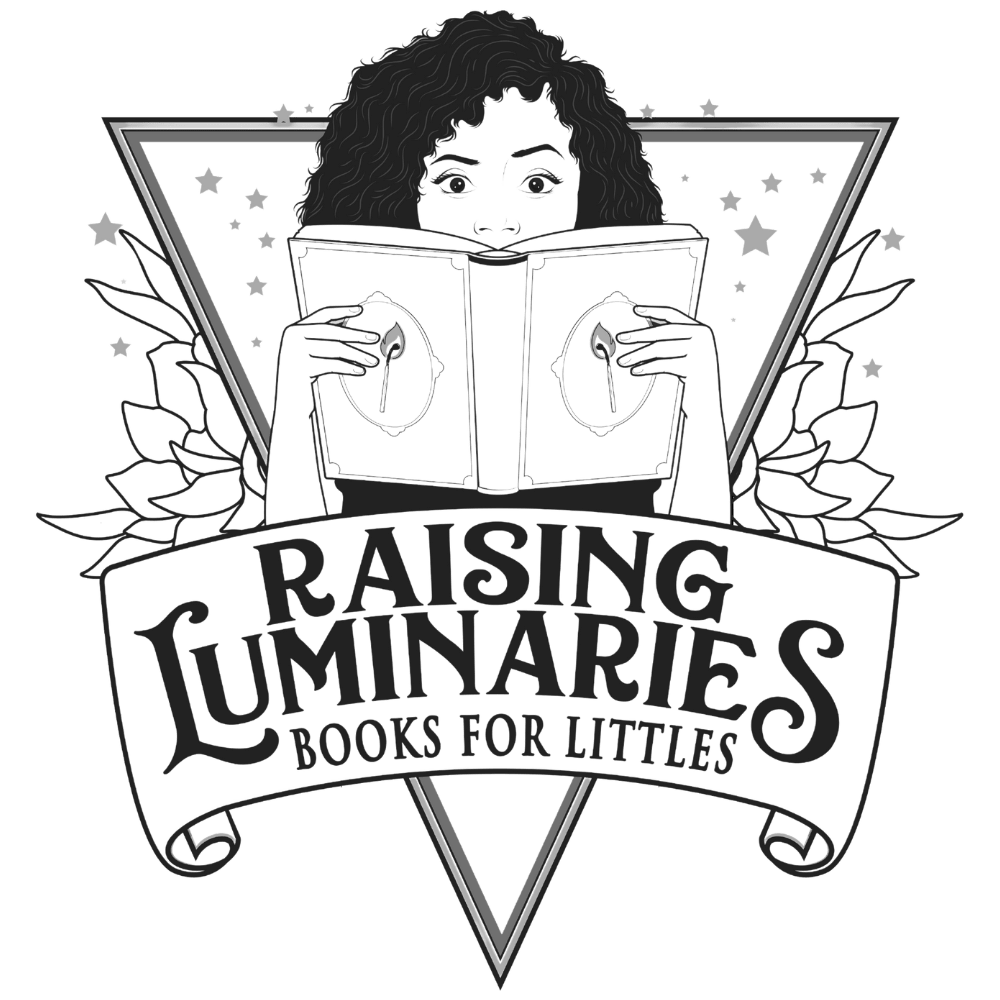[Image: illustration from Benji, the Bad Day, and Me, by Sally J. Pla and Ken Min]
About March’s Good Finds
I search through several hundred books each month, but not all of them fall within the scope of our monthly theme or book collections. Here were our favorite recent finds.
Creating a booklist of our top favorite books that make us giggle has been on my to-do list forever. But we talk about a LOT OF HEAVY STUFF in BFL and there is always something urgent and alarming we need to work on first.
So I’m excited to have these monthly posts to share the books that give us space to be happy humans.
- Age-reference: unless otherwise specified, these books were a hit for Q (age 6.5), R2 (age 4.5)
- Affiliate links: This post contains affiliate links. Check out the full affiliate disclosure along with the BFL statement of accountability.
- If you find glitches here – leave a comment below.
Quick list:
This is a quick link list for folks who like to click through and add these to reading lists. See below for a review of each book.
- Still Stuck (Yoshitake)
- Baby Feminists (Babbot-Klein)
- Zoom! (Munsch)
- Accident! (Tsurumi)
- Masterwork of a Painting Elephant (Cuevas)
- Benji, The Bad Day, And Me (Pla)
- Coloring Without Borders (Various) (Not an affiliate link)
- Maya (Jain)
- Purple, Green, and Yellow (Munsch)
- Frida (Winter)
- Lakas and the Makibaka hotel (Robles)
Good Books:
Books we’ve been searching for
Purple, Green, and Yellow (Munsch)
I know – I’ve been trying to keep this short and limited to 10 books, but mentioning Munsch earlier made me realize I still haven’t found a chance to talk about this book. It’s the single most helpful book we’ve found in discussing drug addiction, and the slippery slope that leads people into such life-altering habits. It’s also an #OwnVoices book – Munsch has disclosed his history with addiction.
Okay, are you starting to see why I love this man so much? This isn’t something he needed to disclose to his readers – in fact, it would have been safer for him NOT to. His vulnerability, I think, his openess, helps to destigmatize addiction and help us protect our kids from it. This man. He’s such a treasure.
Drugs have overwhelmed multiple generations in our family. Raising my kids only to lose them to heroin is one of my greatest fears. We have to show our kids that we love our family members, that they is worthy of love and support. We have to talk about the damage drug addicton has had even on the people who don’t do drugs in our family. We talk about being loving, non-judgemental, but cautious around the addicts we love – because they make illogical decisions to hurt us, even though they love us back.
But mostly we have to talk about how easy it is to become addicted. How a few simple decisions can make it so you can never really get back to the ease and privilege of not being addicted. This book is remarkably helpful in this.
Frida (Winter)
We read a LOT of books about Frida Khalo. Mostly because she’s accessible – authors love to write about her. But also because I’m still searching for the book that discusses her as an intersectional feminist hero.
There are books that talk about her disability (this is the best one for that), and even books that talk about her multiracial heritage – something we often gloss over in an effort to boost her as a Latina hero. And of course, lots books about her as a famous lady artist breaking feminist barriers. But very few talk about all of these intersections. And none of them talk about her open contempt for white feminism (such a shame.)
This is my favorite so far – but it does ignore her multiracial heritage. It does discuss her close relationship with her father. Her mother was more distant, and this broached in the book in a way I like – we get to see how her father’s role as the breadwinner gives him more free time, whereas her mother’s traditional role as a caretaker for children leaves her overwhelmed.
While the book does touch on her disability, and how she uses it and maneuvers through it in a wonderful way, I wish it discussed why Frida, in particular of all her sisters, was so close to her father – he was disabled, too.
I’ll keep searching for the perfect Frida book. Meanwhile, this one is utterly lovely.
Lakas and the Makibaka hotel (Robles)
THIS IS EXCITING!
When I first picked up a copy of Lakas and the Manilatown fish, I found it bizzare. There is this fish that bounces around and like, steals people’s hair? And it visits all these landmarks and the cadence of the text is unfamiliar, even the English part (it’s bilingual Tagalog & English). Which got me really excited, because when I find a book puzzling and hard to understand, it means its breaking some cultural barriers and refusing to cater to the dominant gaze.
First off – there are VERY FEW books about Southeast Asian Americans. I say ‘few’ because I’m sure there are others but I actually can’t think of any off the top of my head.
So these books don’t just celebrate Filipino American culture and history, they also do so unapologetically, without catering to the white gaze. I AM IN HEAVEN. After reading both, I suggest you tackle ‘The Makibaka Hotel’ to get used to the storytelling style before picking up ‘Manilatown fish.’ The men the young protagonist looks up to aren’t polished super heroes – they’re buskers about to be evicted.
This gave us TONS to talk about – about gentrification, about how Asians form tight-knit communities within America for support, about getting to choose our own heroes, about frustration, greed, capitalism, and exploitation of people living in poverty.
Books that made us laugh
Still Stuck (Yoshitake)
This short & quirkly little story made us giggle. You can use it for deeper meaning of disability acceptance if you feel inclined (I was not, I am burnt, particularly as April approaches, which is hell month for autistics.)
At some point, all of us will feel stuck, will become temporarily or permanently disabled – we might realize that our lives might change forever, and we’re going to have to find ways to build a new way of life around it. Or, you can just look at the pictures and giggle.
Baby Feminists (Babbot-Klein)
I didn’t think this board book would have sticking power with a 4-year-old, but R2 has asked to read this book every single day for over a month now. The trick is to act completely surprised every time he lifts a flap.
Before she became a leader, RBG was…a famous lawyer? Head of her class? A toaster? TELL ME – WHAT WAS SHE?!
OH MY GOSH NO WAY, I never would have expected even the great and powerful RBG was a BABY! Just like you were! Just like me! Does that mean….even WE could go on to become luminaries who smash the kyriarchy TOO?!
This is your go-to baby shower gift for for favorite expecting parents.
Zoom! (Munsch)
I was really nervous to dig into the books of Robert Munsch. So many white authors use characters of color as tokens in stories, and I know he does this thing where he bases his characters off real kids. He churns out books at an alarming rate, which is usually a sign of sloppy filler books.
But you know what? I am…ok, hold up a second, I’m tearing up… I just adore this man, more and more with every book. While his books aren’t without their flaws (oodles of sanist language like ‘crazy’ and ‘nuts’), he is working so hard, he’s pushing for inclusion, he’s doing the work we’re asking for. And he’s funny, and he knows how to speak TO kids without speaking DOWN at them. If anything, he’s talking right over parents’ heads and poking our brains in subtle ways we don’t even realize.
So this story has basically everything I’ve ever wanted in a disability book. The protagonist uses a wheelchair, and her disability isn’t erased or ignored – it’s incorporated into the story in a fun, absolutely ridiculous way (as kidlit should be), and she’s both flawed with her unreasonable need for speed like a regular kid AND powerful. The story includes a subtle nod toward folks with disabilities who see abled folks whining about tiny boo-boos, she rescues her brother when he cuts his finger.
I could go on, but I need to keep this short. Get this book, make it a staple on your bookshelf.
Accident! (Tsurumi)
What do we do when things go wrong? The Earthquakes felt both smart and superior watching these characters bumble around, trying to flee from their troubles. Which of course made everything worse. We discussed how getting in a tizzy (what we call the orange zone) can make us clumsier and make things worse. And how stopping to breathe and calm down instead of running away might be a better idea.
And then what’s the best thing to do when we mess up? Apologize. Take responsibility. Offer amends. Perfect!
The illustrations and tiny amount of dialogue were hilarious, and I was delighted to find another multiracial Asian author (this is SO rare).
Masterwork of a Painting Elephant (Cuevas)
This chapter book was too advanced for R2 (4.5) to sit through, and I thought it would be over Q’s head at 6.5, but he and I fell into this deep, timeless space as I read it aloud to him. The story is both…enlightened and goofy (these are not the right words, but they’re the best ones I have on short notice.)
Even Q picked up on themes of a parent’s unconditional love and the sacrifices and dedication we are happy to make for our children. On being selfish, on our first crushes, on who deserves credit for their work and why – oh there are so many good things in here.
I’ve never read anything like it.
Books that gave us hope:
Benji, The Bad Day, And Me (Pla)
I approach books about autism written by allistic parents with a pair of tongs and a garbage bag.
And when I open a story to realize it’s narrated by an allistic sibling of an autistic child, I get my lighter out. It’s okay to have stories about autism FOR allistic siblings. The problem is that these are the tropes of 99% of autism kidlit. And we autistic folks are always a burden and challenge that our allistic siblings need to ‘deal with.’
HOWEVER. Instead of slapping me in the face with supremacy and condescension, this book filled me with ALL THE JOY.
The story isn’t about autism. It’s about a regular kid who (just like all allistic and autistic kids), is going through that gloomy stage around age 6-7 where the whole world is unfair and they are little pessimistic Eyore humans. It’s about sibling rivalry, envy, and feeling unseen and left-out.
This is a book EVERY 6 & 7 year old needs, whether or not they have a sibling. I used it with Q (age 6.5) to validate his feelings when he’s been singled out at school, to discuss what roles he plays in the bad things that ‘happen to him’ (hint: getting sent to the take-a-break space isn’t out of nowhere).
Even though we have brothers two years apart – one allistic and one autistic, both empathized with the older allistic protagonist, AND they both empathized with his younger autistic brother. GENIUS.
While there is an element of resentment – his autistic brother gets special accommodations that he doesn’t get, and that irks him in ways he can’t quite put language to. But the wonderful part is it’s not directed AT his brother – because it SHOULDN’T BE. Also the way the author handles the autistic brother’s after-school class is 100% perfect. We can’t tell which kind of class his brother is in, but whether you want to talk to your kids about ABA abuse and compliance training, or support classes that help give autistic kids support they need – this is a good conversation starter.
And the hero? The hero who saves the day and sees the protagonist? Who reaches out to say – I see you. You matter. I will do whatever is in my power to help you through this.
I WILL LET THE HERO BE A SURPRISE! Oh crap now I’m crying.
So now the Earthquakes mimic the ending and it’s so cute I could explode. GO GET THIS BOOK.
Coloring Without Borders (Various) (Not an affiliate link)
Rebekah L., one of our awesome-lovely-absolutely-fantastic patrons here, sent me Coloring Without Borders, which, because it’s a workbook, I can’t get my hands on from the library. I’ll admit, the price tag seems steep, but it makes sense, since all the profits go toward #FamiliesBelongTogether to help reunite families who were separated at the Mexican/US border.
Since it’s not in our budget, I had linked to it a while back and forgotten about it. I figured it was a basic coloring book but OH MY GOSH. IT IS AMAZING.
We don’t have much luck with interactive workbooks. Coloring books are boring and basic, academic workbooks are tedious, the Questionners series from the Iggy Peck makers rely too much on adult guidance, and open-ended craft books like the Beautiful Oops! Craft book are too vague.
But for THIS book- all you need is a pencil (or whatever your favorite writing implements are). Kids can make it simply or ornate, and the bilingual english-spanish prompts inspire creativity. My kids are ACHING to dig into this book, and I’m so excited to see what they create.
We’re going to buy another copy so each kid can have one, and save both for a plane trip we have to make this summer. The book is SO THICK I’m fairly certain it will entertain them for a large chunk of their 6-hour flight. And probably the flight back.
And then I am going to save their creations forever. It’s better than a diary. This is SO PERFECT. And the profits go to reuniting families! SO GOOD!!!!
Maya (Jain)
I’m slowly amassing books about fear, grieving the death of a loved one, and books by and about women of color. This fits into all three of those lists!
The primary theme in this book is one of perspective. It taps into a fairytale story about the a monsoon and the first baobab tree that rescues all. And how even though things can start out scary and overwhelming, having some faith and hope that we can get through this – that things will be okay – oof. Now that is a lot to pack into a picture book.





1 comment
My barely-two year old may not get all the humor of Still Stuck quite yet, but she is very into the book, requests it by name, and thinks it’s very funny. Thanks for the rec!